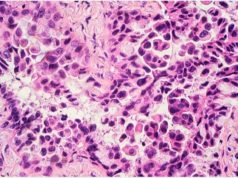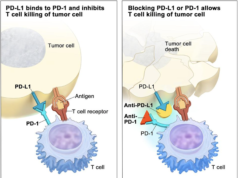A study led by researchers at The University of Texas MD Anderson Cancer Center published in Cancer Discovery showed that combining immune checkpoint inhibitor drugs with targeted therapies that block DNA damage repair (DDR) decreased tumor size in mouse models of small cell lung cancer (SCLC).
Lauren Averett Byers, M.D., and lead author of the study, said that DDR pathways worked hard in cases of SCLC, so blocking them with drugs like PARP and CHK1 inhibitors proved effective in treating the disease in lab cases. The more DNA damage a cancer has, the better it usually fares with immunotherapy treatments.
 This discovery led the team to combine the DDR inhibitor drugs with immunotherapy treatments so that patients would see an increased response to immunotherapy. Byers said the team discovered that adding “either PARP or CHk1 inhibitors to immunotherapy” created a significant decrease in tumor size, and in some, the tumors completely went away.
This discovery led the team to combine the DDR inhibitor drugs with immunotherapy treatments so that patients would see an increased response to immunotherapy. Byers said the team discovered that adding “either PARP or CHk1 inhibitors to immunotherapy” created a significant decrease in tumor size, and in some, the tumors completely went away.
The study showed that the PARP inhibitor olaparib, along with other DDR inhibitors, triggered an immune response in mice, which allowed the immune system to develop more cancer-destroying immune cells in the tumors.
 Although the field of immunotherapy has provided significant advancements in treating lung cancer, small-cell lung cancer has found ways to evade the immune system very well. Byers says there is a much lower response rate to the treatments in SCLC. In the current study, mouse models showed no response to immunotherapy alone, suggesting that the DDR inhibitors were the key.
Although the field of immunotherapy has provided significant advancements in treating lung cancer, small-cell lung cancer has found ways to evade the immune system very well. Byers says there is a much lower response rate to the treatments in SCLC. In the current study, mouse models showed no response to immunotherapy alone, suggesting that the DDR inhibitors were the key.
SCLC is an aggressive form of lung cancer, and it accounts for about 15% of all lung cancers in the U.S., which equates to nearly 300,000 patients. Studies like this one are allowing clinicians to figure out new ways to treat the cancer that has had a low response even to innovative immunotherapy treatments. The mouse model study shows great promise that the combination with DDR inhibitors could be successful in humans as well.
 Clinical trials are currently in process for SCLC patients using PARP inhibitors or immunotherapies. Byers and her team are hoping to start trials to look at the combination approach later in the year, and they even suggest the treatment could be successful at treating other types of cancers with a lot of DNA damage.
Clinical trials are currently in process for SCLC patients using PARP inhibitors or immunotherapies. Byers and her team are hoping to start trials to look at the combination approach later in the year, and they even suggest the treatment could be successful at treating other types of cancers with a lot of DNA damage.




























